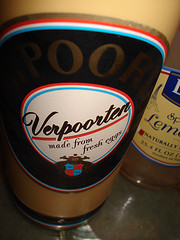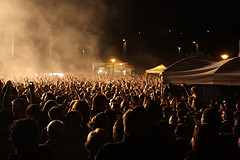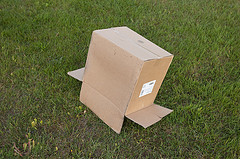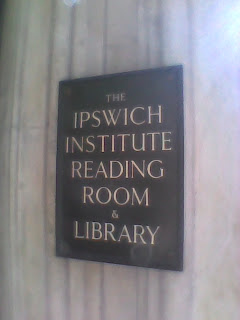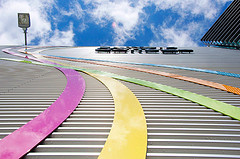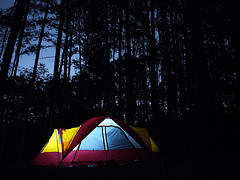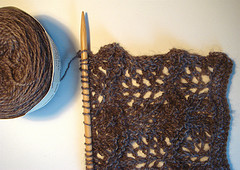I'm grouping my write-ups from the HLF conference loosely according to topic, not in the order appeared. This is the second post of three.
Collections in a Cold Climate
Alison Cullingford, of
@speccollbrad,
100 Objects Bradford,
RLUKUDC and other fame, gave the third talk of the day. She spoke about
'Collections in a Cold Climate: Caring for and Sharing Special Collections in difficult times'.
Alison offered 5 arguments in favour of special collections, and 10 things for us to think about and do. (She apologised that this doesn't add up to 23.)
Selling points:
1) Special collections are a treasure trove. Their uniqueness is not merely pretty frippery: it can have hard financial benefits.
2) We're about much more than text: it doesn't matter if Google Books has the text, your particular book is still important because of its story.
3) The power of the real: things being online isn't the same - people still want to see the real physical object.
4) Learning, teaching and research. The style of teaching (across school and university, I think), is increasingly geared towards engagement with primary material. We're the people that can make that happen.
5) Sharing via Amazing! New! Technology! is now easier that every before. There are fewer gatekeepers to the outside world: we can talk about our own collections, rather than going through intermediaries.
The things we should think about in caring for and sharing our collections are:
1) Proclaiming our value. Don't hide light under a bushel, don't be afraid to use robust language and to speak in the jargon that the people with the money respond to.
2) FInd partners and use them. Work out who's speaking on your behalf in your organisation and make use of them. Identify the people with soft power, too.
3) Be 'lazy' - don't try and do everything yourself, but try and find people who'll do it for you, e.g. collaborating with museums on schools work.
4) Explore new tech. Know what's out there, but you don't have to use it all.
5) Think about mission and strategy, i.e. work out how everything fits together, and which things you don't have to do.
6) Make the best use of your, or your staff's time. Staff time may be the only resource you have, so value it.
7) Dare to think creatively. You can't do more of the same with less of the same, but you can do something different instead. In Alison's case this means exhibiting online, not in a physical space.
8) Skills matter. Use the Rare Books and Special Collections Group framework (or the ALA equivalent) to campaign for training. Market yourself as someone with specialist skills and knoweledge.
9) Know what's going on - what the agendas are, and how you can use them to your advantage.
10) Share your own number 10. Mine is to use the enthusiasms of the people that you have - Alison added that if you do that you have to account for what'll happen if they leave!
If you want to know more, Alison has
a book coming out soon.
The RLUK
Unique and Distinctive Collections Project will be producing a report about special collections of all kinds and not just in RLUK libraries next September.
Using volunteers at Bishopgate's Institute
Edward Weech spoke about how the
Library of the Bishopsgate Institute using volunteers to enhance what they can do and offer. He was clear that they do not use volunteers to replace paid staff, but use them to work on specific projects that couldn't otherwise be undertaken.
Volunteers are used in the library to help with a retrospective cataloguing project. There are a number of rules governing the volunteers' work: each volunteer comes in for half a day per week, and there is a miniumum commitment of three months. Their travel expenses are paid, are their work is also recognised with twice-termly tea and cakes, a newsletter, a volunteering certificate, and (for those who have volutneered for 40 hours or more) a reference. It was noted that not all the volunteers want to have tea, cakes, newsletters etc. - some just want to get on and catalogue!
Volunteers are generally recruited from retired librarians, library school students, and people currently working in libraries who would like to gain cataloguing experience. Volunteers are expected already to have computing skills, and ideally to have knowledge of library work, library management systems, and possibly cataloguing. There are around 6 volunteers at any given time. The longest-serving has now been there four years, but some, especially those who have negotiated time away from work to participate, will only stay the minimum three months.
All of the volunteers' work is checked by staff before it is unsuppressed on the OPAC. This means that, along with training and supervision, there is quite a lot of staff time invested in the volunteering programme. Since the retrospective cataloguing project started in 2005, 50,000 records have been added to the catalogue in total, of which 8,600 were added by volunteers (that's about 17%).
The benefits of the volunteer invovlement is not therefore that they're a cheap way of creating lots of catalogue records. The benefits, as described by Edward are that the staff learn from the volunteers (whether they're students with new ideas, or more experienced librarians who have worked in other libraries), and that the Library and Institute are promoted by the volunteers and advocated for when they go elsewhere.
Friends Organisations
Karen Attar spoke about the
Friends of Senate House Library. The Friends were founded in 1988, and in 2009 had a relatively modest membership of 140. Karen noted that the library's posistion within London, and within the University of London meant that it doesn't necessarily have a distincitve attraction for the general public. However, the Friends have contributed to the Library, particularly through funds raised from bequests. They have bought books and other materials, paid for conservation work and materials, paid for cataloguing, and have developed a
'Befriend a Book' programme.
The Friends of Senate House Library organise a variety of events including talks, visits, book club meetings and a newsletter. Interestingly, special exhibition viewings don't need to be 'private' - the addition of a curator talk and some refreshments makes it a good draw for members.
